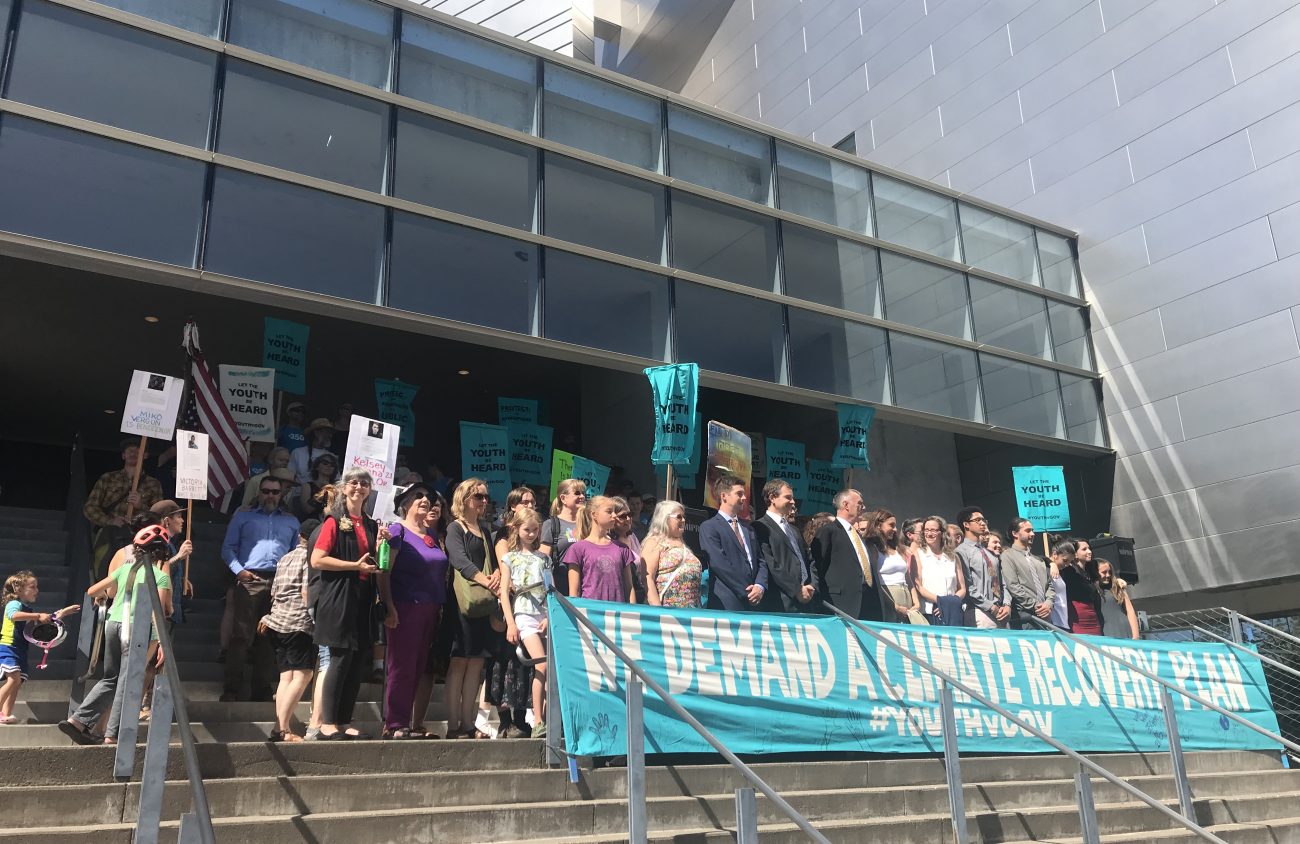Although the Juliana v. U.S. case — also known as Youth v. Gov. — doesn’t start its trial until late October, both plaintiffs and defendants of the landmark climate change case came together in the courtroom today.
Juliana v. U.S., supported by local nonprofit Our Children’s Trust, is the lawsuit in which 21 youth plaintiffs are suing the federal government for actively harming future generations with its complicity in climate change.
Attorneys representing the youth plaintiffs, as well as some of the plaintiffs themselves, and attorneys representing the U.S. government sat in Courtroom One in the Wayne L. Morse Federal Courthouse for about two hours on July 18 for an oral argument hearing. They were met with a full courtroom as well as three full overflow courtrooms showing live streaming video.
The defendants, represented by Marissa Piropato and Frank Singer of the U.S. Department of Justice, argued for summary judgment on the terms of causation — or to dismiss the case before trial due to lack of causation that the U.S. government has directly injured the plaintiffs. They also argued that the court should not be the deciding factor in a case that would essentially judge U.S. policy over past decades. Lastly, they argued that President Donald Trump should be dismissed from the case with prejudice, meaning that he would be dismissed permanently from the suit, never being able to be brought into the case at any point.
The youth plaintiffs, represented by Julia Olson, Andrea Rodgers and others from Our Children’s Trust, argued against these claims. They also argued that President Trump should be dismissed from the case, but without prejudice, meaning he could be brought back into the case at a later time if needed.
Federal Judge Ann Aiken, the judge presiding over the case, said she would decide on these motions in “the near future.”
In the hearing, a pre-trial chance to further explain arguments, both sides argued the most important aspects of their positions.
Mainly, the plaintiffs’ attorneys reiterated the causality between climate change and plaintiff injuries (such as anxiety and nightmares from instability in their homes from droughts, hurricanes and floods increased by climate change).
One example Olson drew from was that of Jaime Butler, one of the youth plaintiffs not present at the hearing. Butler is Native American, of the Navajo clan, but had to leave her home on her reservation due to water scarcity, an effect of climate change, Olson said. She also said that climate change harmed Butler and her tribe’s ability to participate in traditional ceremonies.
The defendants argued that these injuries cannot specifically be tethered to climate change or the U.S. government.
“They need to show specific causation,” Piropato said. She said there are too many links in the chain of causation “to link to anything the United States government has legally done.”
Youth plaintiffs gained a massive amount of support from the Eugene community at a rally before the trial, in the courtroom and a press conference afterwards.
At the press conference a few of the youth plaintiffs told stories of climate change’s effects on them.
“I have been suing the government for three years and during those three years I have seen the trees on my farm near Roseburg, Oregon, start dying because of drought stress,” plaintiff Jacob Lebel said. “I have breathed the smoke from the mega wildfires in our regions that are getting worse from climate change.”
Lebel, 21, said to know that these climate change events are only the “tip of the iceberg for my generation is one of the worst feelings that I can think of.”
“Of all the crimes that a nation can commit against its citizens, the deliberate and conscious poisoning of all the basic resources that we can depend on is probably the most far-reaching and insidious and we will only see those full effects in my lifetime and in my children’s lifetime,” he said.
In concluding the press conference, Olson said Our Children’s Trust and the plaintiffs are ready for trial.
“The United States government is the most culpable party on the planet for causing climate change,” she said. “When we get to trial, we’ll easily be able to prove that.”
According to a press release from Our Children’s Trust, on July 17 the U.S. Government filed a motion with the Supreme Court to stay, or halt, the trial. The Supreme Court has not decided on that motion yet, but Olson said she is preparing to fight it.
“Right now, we’re fighting a request for a stay in front of the Supreme Court. Our brief is due on Monday and we’ll be ready,” she said.
The official trial is set to begin Oct. 29, barring delays or dismissal.
